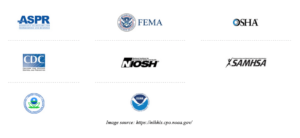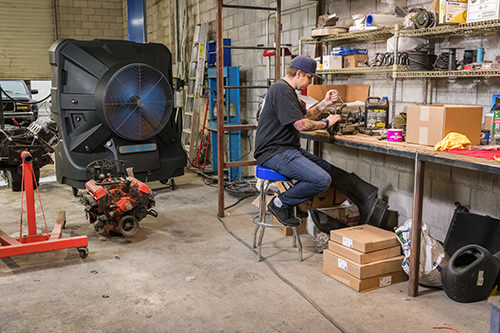
Government Agencies Focused on Heat Education
When a certain topic is prevalent enough to be addressed by at least EIGHT separate government agencies with specific information dedicated to education, it is clearly a very important matter. One topic with this level of coverage is that of heat safety illness and prevention, and it gets a great deal of attention from a wide range of health, safety and meteorology-based agencies. Certainly, this attention is warranted, as the National Weather Service (part of the National Oceanic and Atmospheric Administration, or NOAA) notes that heat is one of the leading weather-related killers in the United States, resulting in hundreds of fatalities each year and even more heat-related illnesses.
In fact, heat results in more fatalities than any other weather-related cause, even hurricanes or floods. Cooling can play a key role in proactively mitigating heat in the workplace and at home that leads to a safer environment. This is why our team is dedicated to sharing how portable evaporative coolers provide a solution to hot environments where traditional A/C is impractical.
Below, we list each agency website in addition to www.weather.gov (as noted above) and their link to specific resources. You’ll find that many of the agencies often post links to each other. This entwined network of educational downloads helps to reiterate the danger of heat, offer preventative measures and provide actionable steps in the case of extreme heat.
Worker safety related to heat safety is addressed by the:
- U.S. Department of Labor – Occupational Safety and Health Administration (OSHA): In addition to a wide-variety of resources and guidelines designed to aid employers in ensuring they protect American workers in their work environments, OSHA offers a free OSHA Heat Safety App for both Android and iPhone to assist employers in assessing extreme heat danger in real time.
- Centers for Disease Control and Prevention (CDC) – The National Institute for Occupational Safety and Health (NIOSH) –This agency is focused on “Promoting productive workplaces through safety and health research.” NIOSH has published criteria for a recommended standard for occupational heat stress and offers a document that includes recommendations for employers on how to prevent heat-related illnesses. Resources include NIOSH Fast Facts: Protecting Yourself from Heat Stress and the associated NIOSH heat stress fact sheet.
Consumer safety around heat safety is addressed by the:
- Environmental Protection Agency (EPA) and the Centers for Disease Control and Prevention (CDC) – To help combat heat stress illness and fatalities, the EPA and CDC section focused on “Climate and Health” have developed an electronic booklet entitled Climate Change and Extreme Heat: What You Can Do to Prepare. This 20-page booklet defines extreme heat and addresses various heat-related topics, including a projection for the future of extreme heat conditions, who is most at risk from extreme heat and what can be done to minimize the risk of heat illness.
- Department of Homeland Security & FEMA – Ready.gov/heat – The DHS and FEMA provide an extreme heat education and checklist for preparing and being safe during a heat wave, as well as an extreme heat toolkit designed for social media messaging.
- US Health & Human Services – Public Health Emergency – After emergencies such as hurricanes, this website emphasizes how often temperatures and humidity both remain high in many areas following hurricanes. As you storm clean-up begins, ensure steps are taken to prevent heat-related illnesses. Their tips and guidance are listed here as part of the Office of the Assistant Secretary for Preparation and Response (ASPR): https://www.phe.gov/about/aspr/pages/default.aspx. The site also links back to the CDC.
- National Integrated Heat Health Information System (NIHHIS) – The NIHHIS is a jointly developed system by the CDC and the NOAA. The NIHHIS is an integrated system that builds understanding of the problem of extreme heat; defines demand for climate services that enhance societal resilience; develops science-based products and services from a sustained climate science research program; and improves capacity, communication and societal understanding of the problem in order to reduce morbidity and mortality due to extreme heat.
- Substance Abuse and Mental Health Services Administration (SAMHSA) – People with mental illness (including older adults and those taking prescription medications that impair the body’s ability to regulate temperature) can also be at increased risk of disease and death in extreme heat. The Substance Abuse and Mental Health Services Administration provides helpful information for serving these populations.
To learn more about how economical evaporative cooling works and can help prevent heat stress in your environment, please check out this post. You can also visit our product page to learn more about current models of Portacool portable evaporative coolers.

